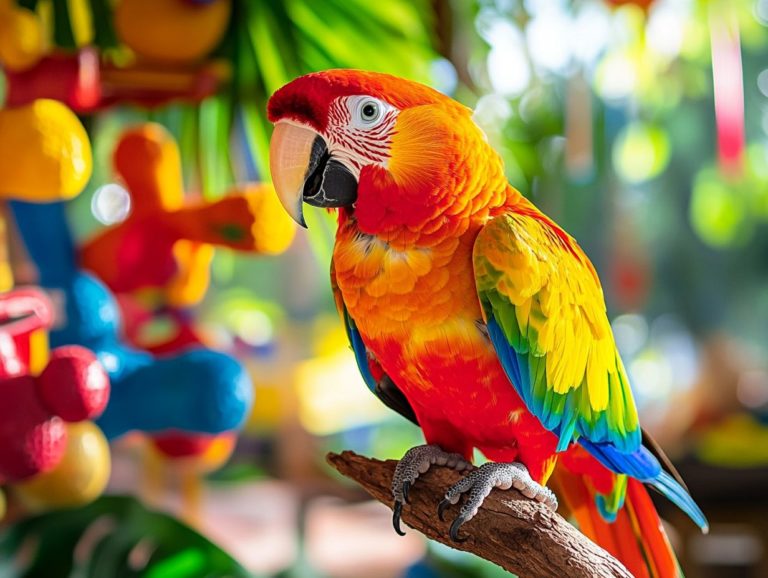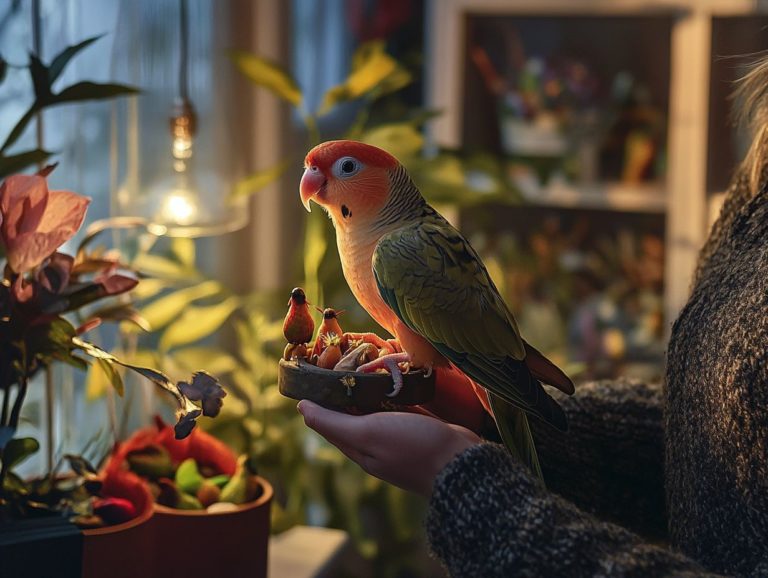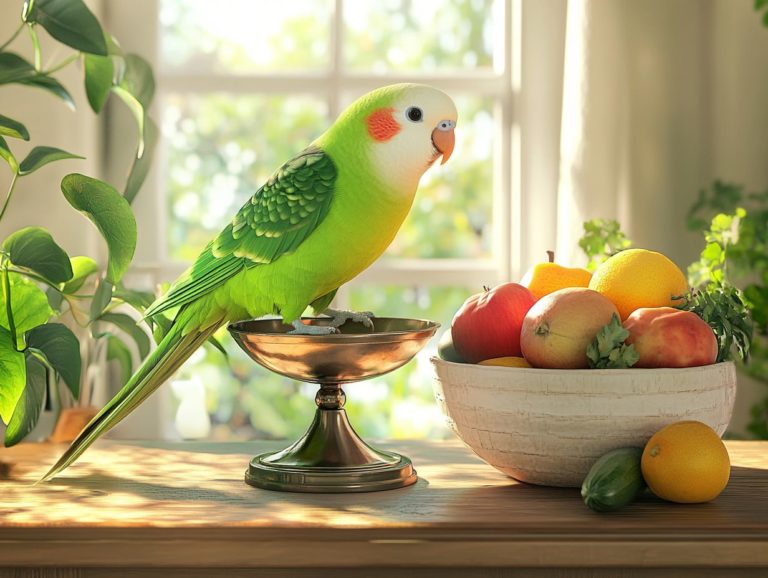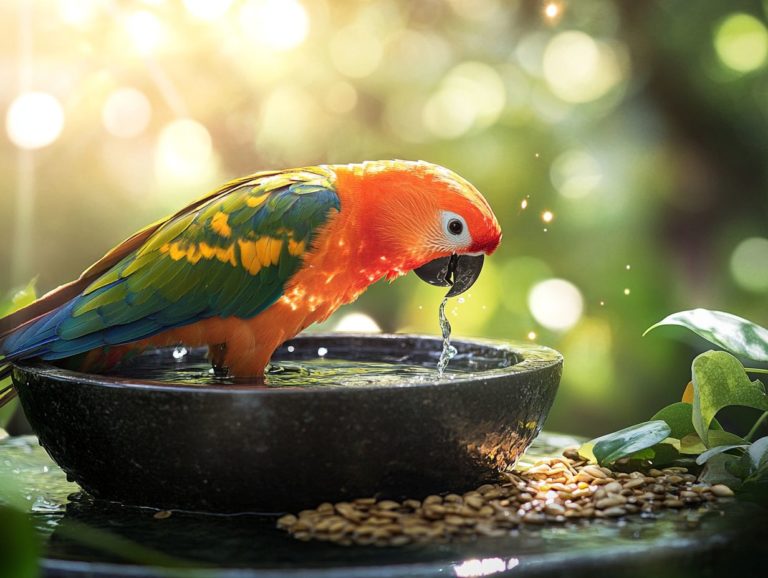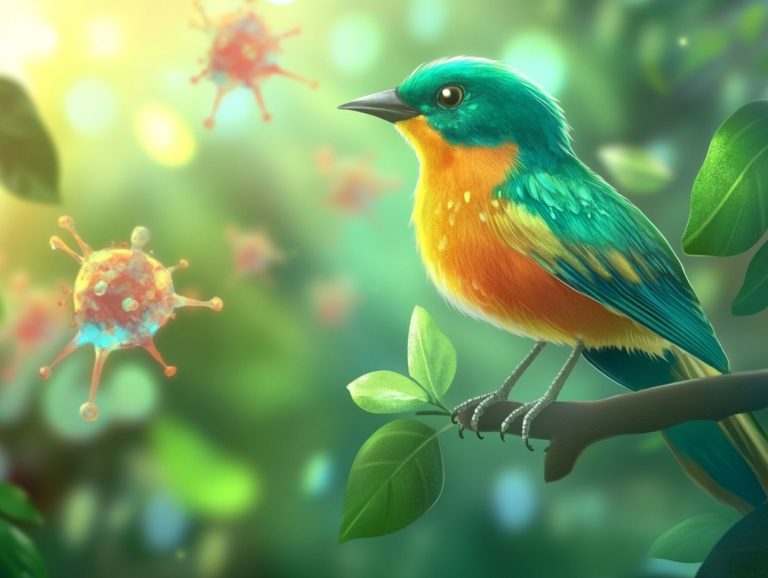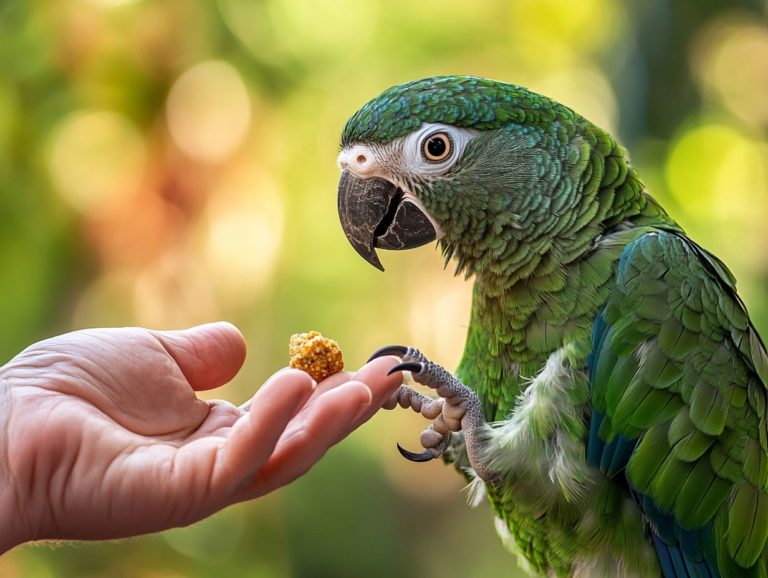5 Signs Your Bird May Need a Vet Visit
Birds make captivating companions, yet their knack for concealing illness can complicate the early detection of health issues.
As a conscientious bird owner, it’s essential for you to remain vigilant regarding changes in your pet’s habits and behavior.
Here are five critical indicators that suggest your feathered friend might require a visit to the vet. From changes in eating patterns to respiratory troubles, recognizing these signs is vital for maintaining your bird’s well-being and ensuring a long, healthy life.
Contents
- Key Takeaways:
- 1. Changes in Eating Habits
- 2. Changes in Droppings
- 3. Changes in Behavior
- 4. Changes in Appearance
- 5. Respiratory Issues
- When Should You Take Your Bird to the Vet?
- Frequently Asked Questions
- 1. What are the signs that my bird may need a vet visit?
- 2. How can I tell if my bird’s behavior is a cause for concern?
- 3. What changes should I look for in my bird’s appearance?
- 4. Can changes in my bird’s droppings signal illness?
- 5. Is difficulty breathing a sign my bird needs a vet?
- 6. Why is loss of appetite a major concern for my bird’s health?
Key Takeaways:
- Changes in eating habits could indicate a health issue and may require a vet visit.
- Monitor changes in your bird’s droppings. They can reveal serious health issues and may necessitate a vet visit for proper diagnosis and treatment.
- Unusual behaviors in your bird, such as increased aggression or lethargy, could be a red flag for potential health problems. Talk to an avian vet right away if your bird shows unusual behavior.
1. Changes in Eating Habits
If your bird s eating habits change, it might be the first sign of a health problem. This can signal that it s time for you to step in and assess any food preferences or signs of illness in your avian companion.
For example, if you notice a decreased appetite, it may suggest stress, illness, or even boredom. A sudden refusal to eat certain foods could indicate allergies or a newfound preference for flavors, which might not always contribute to a balanced diet. On the flip side, an increase in food consumption could point to metabolic issues or other health concerns.
It s vital for you to closely monitor these changes, as they play a crucial role in gauging your bird’s overall health. Being proactive allows for timely interventions, ultimately promoting a longer, happier life for your feathered friend.
2. Changes in Droppings
Watch for changes in your bird’s droppings. They can reveal serious health issues! Symptoms may include diarrhea or unusual coloration both of which can signal underlying avian diseases that require immediate veterinary attention.
Different types of droppings can unveil various health issues. For instance, if you notice watery stools, it might point to infections or dietary problems, while green or yellow feces could suggest liver issues. It’s essential to monitor not just the appearance, but also the frequency and consistency of droppings, as sudden changes often indicate distress or illness.
If your bird shows additional symptoms like lethargy, shifts in appetite, or puffed-up feathers alongside abnormal droppings, it may be time for an urgent veterinary consultation. To learn more about recognizing these signs, check out how to tell if your bird is sick. Early identification and prompt action can significantly impact treatment outcomes, ensuring the well-being of your feathered companion.
3. Changes in Behavior
Changes in your bird’s behavior, like increased aggression, lethargy, or unusual vocalizations, can serve as clear warning signs that something is amiss. Be aware of these 6 signs your cockatiel may be sick, and it’s essential to consult with an avian vet to pinpoint potential causes and determine the appropriate supportive care.
For example, if your once-friendly bird suddenly starts isolating itself and shying away from you and other pets, this withdrawal may signal underlying issues that need addressing after all, social creatures like birds thrive on interaction.
Altered activity levels, such as a decrease in flying or playing, can also indicate pain or illness that, if left unchecked, could worsen over time. Paying close attention to these behaviors is vital; they are key indicators of various health conditions.
Taking timely action not only aids in diagnosing the problem but also significantly boosts the chances of a successful recovery, ensuring your feathered friend remains a happy and thriving companion.
4. Changes in Appearance
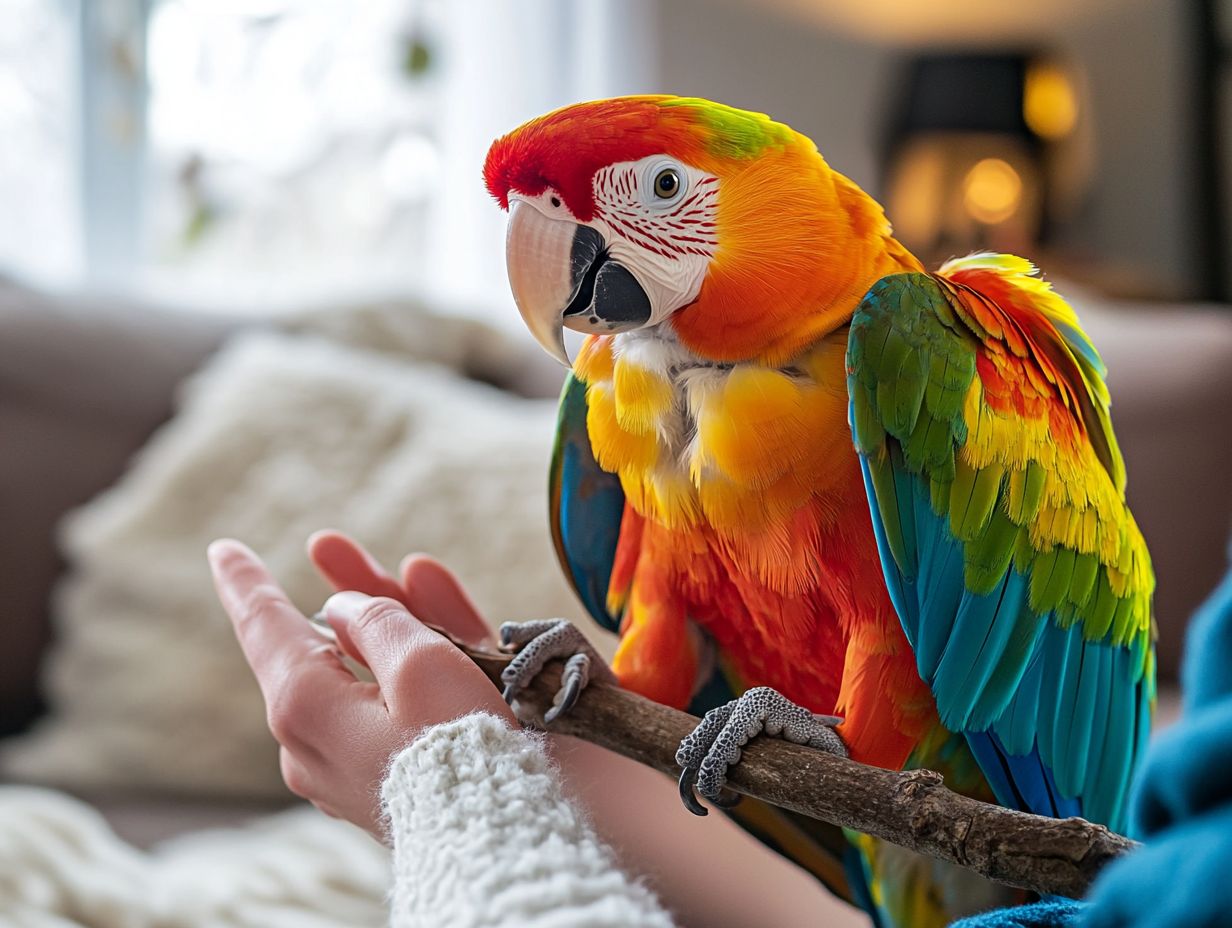
The appearance of a bird can reveal important insights about its health. Signs like droopy wings, fluffed feathers, and eye discharge may indicate serious conditions, so recognizing signs of pain in your pet bird is crucial for ensuring it receives immediate veterinary care.
Be attentive to other indicators too, like a dull or discolored beak, changes in eating habits, or a hunched posture. These signs often suggest underlying health issues, and understanding bird behavior as health indicators can help ensure they receive urgent attention.
For example, if a bird seems reluctant to perch upright, it might be experiencing pain or weakness. Abnormal feather conditions, like excessive molting or patchiness, could hint at nutritional deficiencies or infections.
Paying close attention to these signs is essential. They reflect your feathered friend s well-being and highlight the importance of timely intervention to prevent severe complications.
5. Respiratory Issues
Respiratory issues in birds can show up as wheezing, coughing, or difficulty breathing. These are emergency signs that demand immediate veterinary attention, as they may indicate pneumonia or other serious bird diseases.
These symptoms often point to infections or inflammation that can escalate quickly without prompt treatment. Additionally, it’s important to recognize signs your bird needs more mental stimulation, as birds instinctively hide their discomfort, so you must remain vigilant.
Recognizing the signs early can be the deciding factor between recovery and complications. For pneumonia cases, timely medical help can treat the infection and restore normal breathing, improving your bird’s quality of life.
Being aware of these warning signs and acting swiftly is crucial for any bird owner.
When Should You Take Your Bird to the Vet?
Knowing when to take your bird to the vet is key to ensuring its well-being. Additionally, being aware of 5 signs your bird is not eating enough can help you identify when it’s time to consult a qualified avian vet, especially if you notice health deterioration, persistent abnormal behavior, or urgent care needs.
If your bird suddenly changes its appetite, excessively plucks feathers, or seems lethargic, those are serious red flags. To ensure your pet’s well-being, be aware of the top signs of a healthy pet bird. Other symptoms to watch for include breathing difficulties, changes in droppings, or unusual vocalizations.
Don t ignore sudden aggression or withdrawal, as these behaviors can signal underlying issues. Regular check-ups are essential for establishing a health baseline and catching potential problems early.
By prioritizing preventive health measures, you play a vital role in your feathered companion’s long-term happiness and vitality.
How Often Should Birds Have Check-Ups?
Regular check-ups with an avian vet are essential for your bird’s health. These visits help spot early signs of health issues and ensure your pet receives the preventive care it needs.
Start these visits when your feathered companion is still a chick to lay the groundwork for a lifetime of good health. As birds age, their needs change, so it’s vital to adjust your approach.
Younger birds benefit from annual examinations, while older ones might require bi-annual check-ups to monitor any developing conditions. Building a relationship with a trusted avian veterinarian enhances your pet s care.
This partnership helps professionals understand your bird’s health profile and behaviors, ultimately improving its well-being.
What Are Common Health Issues in Birds?
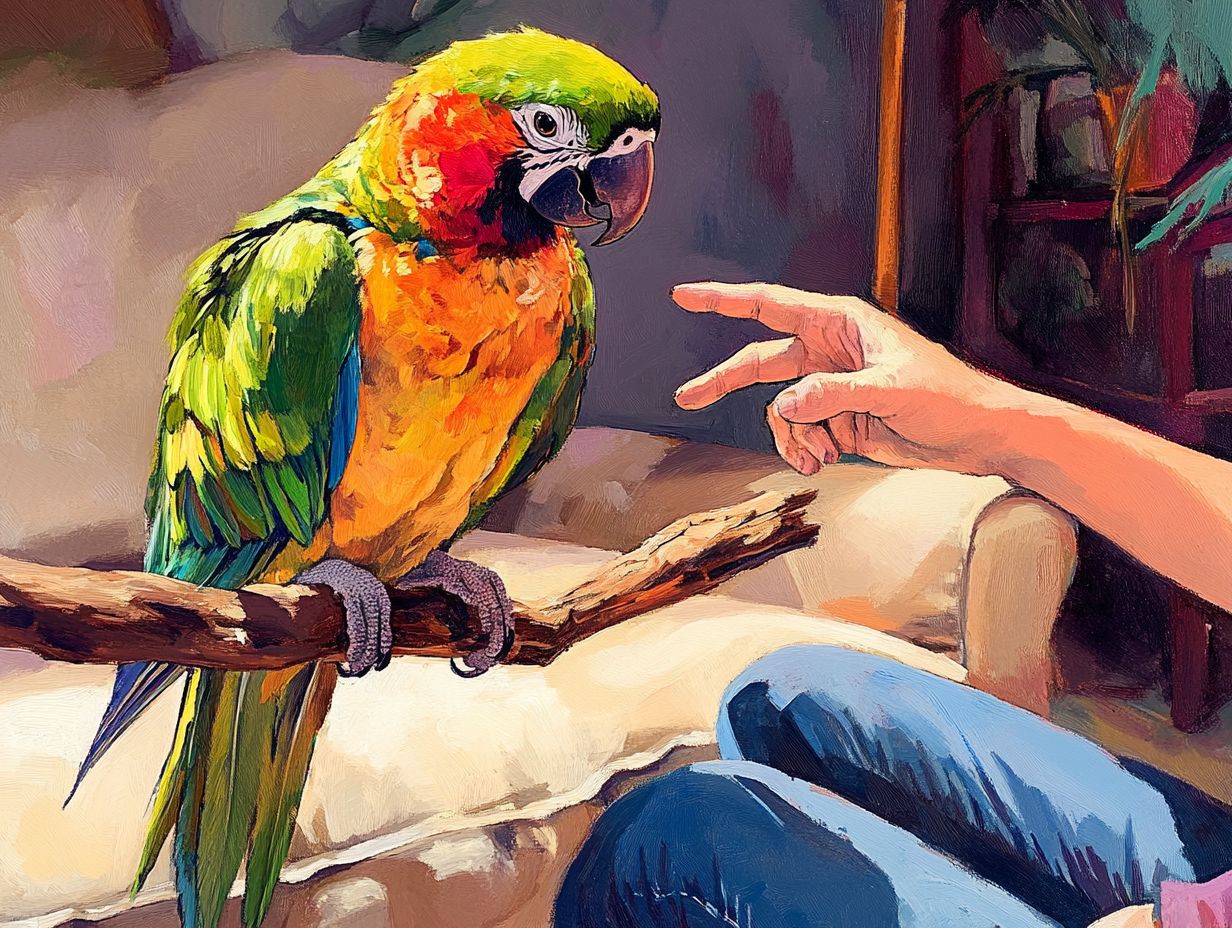
Understanding common health issues in birds like respiratory problems, nutritional deficits, and avian diseases such as psittacosis is crucial for bird owners. Recognizing symptoms early allows you to seek appropriate veterinary care.
Stay informed about these conditions to spot subtle behavioral changes or physical signs of distress. Respiratory issues may show up as coughing or wheezing. Nutritional deficiencies can manifest through poor plumage or lethargy. Diseases like psittacosis often come with systemic symptoms, such as diarrhea and a lack of appetite.
Being aware of these variations enables swift action and boosts your confidence in maintaining your pet s well-being.
How Can You Prevent Health Issues in Your Bird?
Preventing health issues requires an overall plan. This includes providing proper nutrition, addressing environmental factors, and implementing stress reduction techniques to cultivate a healthy and stable living environment.
Offer a balanced diet rich in essential vitamins and minerals tailored to your bird’s species. Maintaining a clean, spacious living area is also crucial. Ensure opportunities for mental stimulation through engaging toys and social interactions.
Regular interaction with both humans and other birds is vital for reducing stress levels and promoting better emotional well-being. Proactive steps in these areas can significantly lower the risk of illness and enhance your bird’s health and happiness.
What Should You Bring to a Vet Visit for Your Bird?
Don t forget to bring these important items to your veterinary consultation: your bird’s health history, any medications, and samples of their bird food. This information enables the avian vet to conduct a thorough examination and provide accurate diagnoses.
Having your bird’s vaccination records is crucial. This documentation gives the vet valuable insights into your bird’s health and immunization status. Consider bringing a fresh droppings sample as it can be invaluable for testing and identifying underlying health issues.
It’s wise to jot down specific questions or concerns to discuss during the appointment. Being well-prepared fosters a productive dialogue and aids the vet in crafting a tailored care plan for your feathered friend.
What Are the Benefits of Regular Vet Visits for Birds?
Regular veterinary visits offer many benefits, such as early health monitoring, preventive measures against diseases, and invaluable guidance on maintaining your pet’s overall wellness.
Establishing a routine with an avian veterinarian enhances your bird s well-being. This proactive approach significantly reduces the risk of illness and stress, allowing your birds to thrive.
By fostering a trusting relationship with an avian vet, you empower yourself to seek advice on crucial aspects like nutrition, behavior, and habitat enrichment. This commitment contributes to a longer, healthier life for your cherished feathered companions.
Frequently Asked Questions
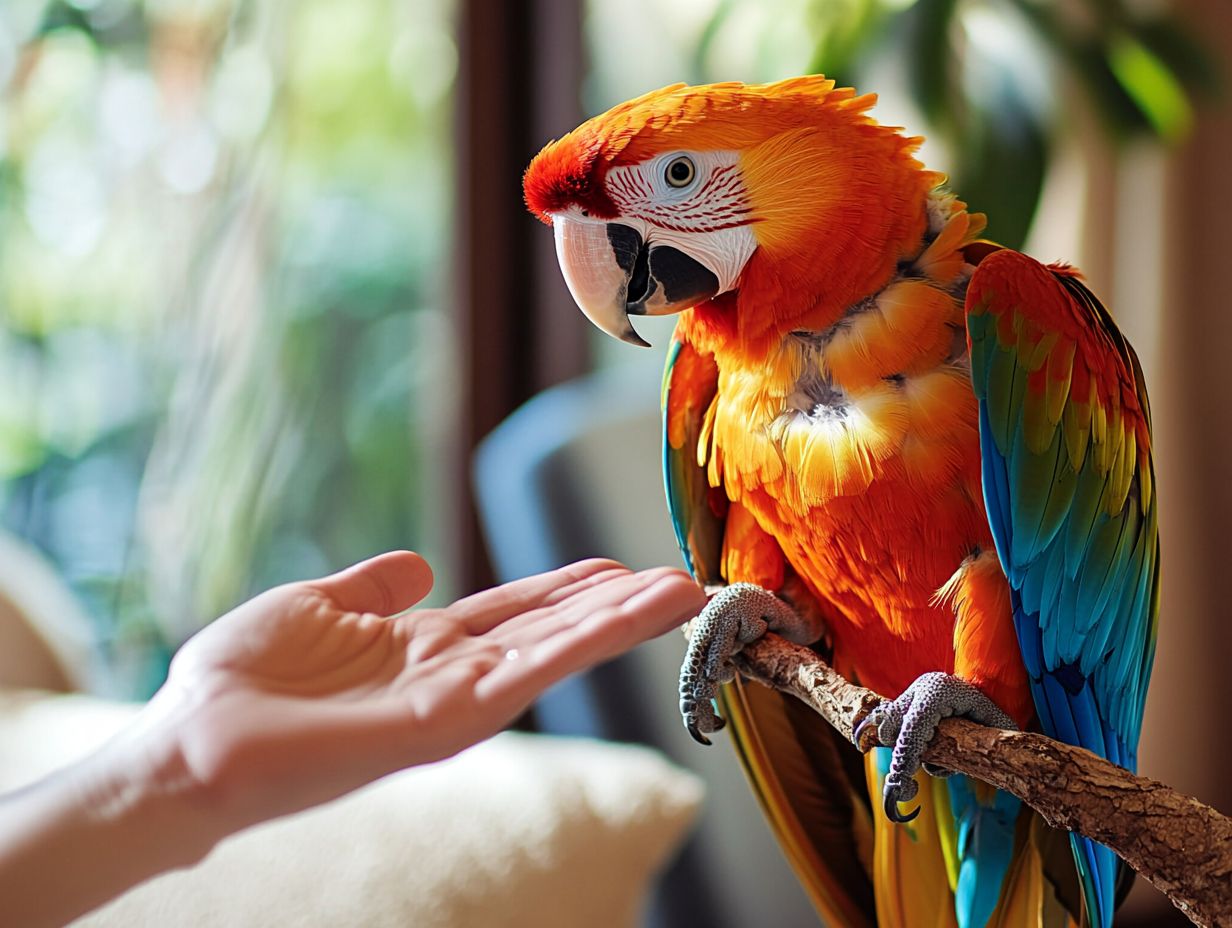
-
1. What are the signs that my bird may need a vet visit?
The signs include changes in behavior, changes in appearance, changes in droppings, difficulty breathing, and loss of appetite.
-
2. How can I tell if my bird’s behavior is a cause for concern?
If your bird suddenly becomes aggressive, lethargic, or excessively vocal, it could indicate an underlying health issue. Additionally, these changes may also suggest boredom, so being aware of 5 signs your bird is bored is important. It’s best to schedule a vet visit.
3. What changes should I look for in my bird’s appearance?
Look for any changes in your bird’s feathers, like bald patches or color changes. These could mean your bird is unwell and needs a vet.
4. Can changes in my bird’s droppings signal illness?
Yes, if you notice changes in your bird s droppings like color, consistency, or frequency it might indicate a health issue. Take your bird to a veterinarian as soon as possible.
5. Is difficulty breathing a sign my bird needs a vet?
Yes, struggling to breathe can be serious. Don’t ignore this! Get your bird to a vet right away for proper diagnosis and treatment.
6. Why is loss of appetite a major concern for my bird’s health?
Birds have sensitive digestive systems, so any drop in appetite could signal a health problem. Consult your vet to find out what might be wrong and how to help your bird eat well again.

